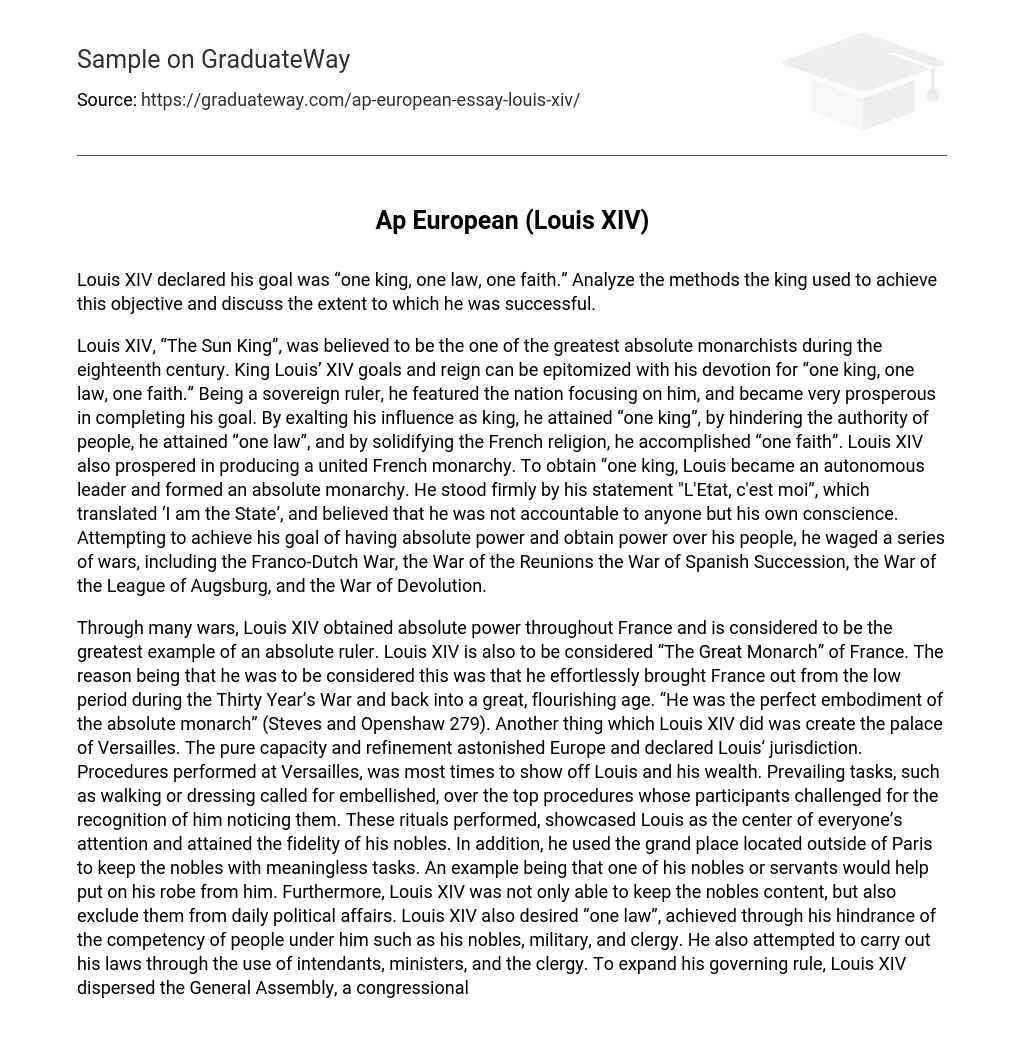Louis XIV declared his goal was “one king, one law, one faith.” Analyze the methods the king used to achieve this objective and discuss the extent to which he was successful.
Louis XIV, “The Sun King”, was believed to be the one of the greatest absolute monarchists during the eighteenth century. King Louis’ XIV goals and reign can be epitomized with his devotion for “one king, one law, one faith.” Being a sovereign ruler, he featured the nation focusing on him, and became very prosperous in completing his goal. By exalting his influence as king, he attained “one king”, by hindering the authority of people, he attained “one law”, and by solidifying the French religion, he accomplished “one faith”. Louis XIV also prospered in producing a united French monarchy. To obtain “one king, Louis became an autonomous leader and formed an absolute monarchy. He stood firmly by his statement “L’Etat, c’est moi”, which translated ‘I am the State’, and believed that he was not accountable to anyone but his own conscience. Attempting to achieve his goal of having absolute power and obtain power over his people, he waged a series of wars, including the Franco-Dutch War, the War of the Reunions the War of Spanish Succession, the War of the League of Augsburg, and the War of Devolution.
Through many wars, Louis XIV obtained absolute power throughout France and is considered to be the greatest example of an absolute ruler. Louis XIV is also to be considered “The Great Monarch” of France. The reason being that he was to be considered this was that he effortlessly brought France out from the low period during the Thirty Year’s War and back into a great, flourishing age. “He was the perfect embodiment of the absolute monarch” (Steves and Openshaw 279). Another thing which Louis XIV did was create the palace of Versailles. The pure capacity and refinement astonished Europe and declared Louis’ jurisdiction. Procedures performed at Versailles, was most times to show off Louis and his wealth. Prevailing tasks, such as walking or dressing called for embellished, over the top procedures whose participants challenged for the recognition of him noticing them. These rituals performed, showcased Louis as the center of everyone’s attention and attained the fidelity of his nobles. In addition, he used the grand place located outside of Paris to keep the nobles with meaningless tasks. An example being that one of his nobles or servants would help put on his robe from him. Furthermore, Louis XIV was not only able to keep the nobles content, but also exclude them from daily political affairs. Louis XIV also desired “one law”, achieved through his hindrance of the competency of people under him such as his nobles, military, and clergy. He also attempted to carry out his laws through the use of intendants, ministers, and the clergy. To expand his governing rule, Louis XIV dispersed the General Assembly, a congressional bureau of the French senatorial that is now considered to be a modern-day parliament or senate. Louis XIV thought that it was absolutely necessary that he had total control over all of the military. “This army was an instrument of internal as well as external policy” (Davies 617). He made sure to infiltrate all areas of France to make sure his policies were being followed throughout the land. This later helped prevent a civil war that could have broken out as a result being that the nobles were constantly fighting over power, demonstrated likewise in La Fronde. Although He claimed that he had the supreme authorization in France, he was very reliant on the partnership of his officials to prolong his authority.
Then so, Louis became prosperous in consolidating his “one law”, and was not influenced by others. Lastly, Louis aimed for “one faith”. Louis XIV was a faithful Catholic, and believed that everyone under him must be Catholic too. Louis also became heavily influenced by the Jesuits during his reign. (Louis XIV and religion). Although Louis was not intolerant to Protestants he did not approve of them. Another thing was that he hated division and therefore oppressed non-Catholics. One thing that he did was revoke the Edict of Nantes, or known as the Edict of Fontainebleau, which meant that Huguenots were permitted to give praise in French towns, composing this as a very strong example of Louis’ standpoint regarding Protestants. However the creator the Edict of Nantes was a protestant and created it for toleration (Caldwell Beeler Clark 250). This then allowed for the royal officials to shut down Protestant churches, schools, and clergy. It also ordered that all of the Protestant children to be baptized and converted to Catholicism (Krieger 85). Another thing that Louis attempted was convert the Huguenots over to Catholicism by using military enforcement. Those that repudiated to converting were killed without any sympathy. Louis XIV vindicated to decree France by legal authority, believing that God chose certain people to rule over others. He also made it is goal to convert the whole kingdom of France over to Catholicism even if it meant that killing was involved.
Lastly, he enforced all of his lieges to be devoted to the precedents and the Church. This associated France with the general belief that later continuously helped form the religion of France. Through Louis’ revocation of the Edict of Nantes and its aftereffect on the economy, Louis successfully gained uniformity in the French religion, which he believed, would later on help the French nation greatly. To conclude, King Louis XIV took up his “One king, one law, one faith” belief regarding his authority and ruling. Louis XIV was prosperous in producing this central, powerful French monarchy. He was triumphant in his ambition and was able to, attribute to his own exaltation, the limitation of other people’s aptitude, and in the unification of religion.





